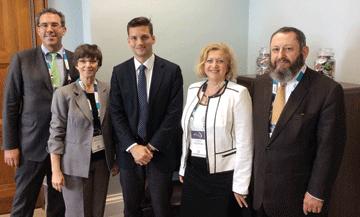The intense 48-hour fourm included in-depth discussions and lively debates on the most pressing issues faced by Jews the world over. {mprestriction ids="1,3"}The issues are critical, complex and far-reaching. For example, the resurgence of both old as well as new forms of anti-Semitism have accelerated in Europe, the Middle East and at college campuses across the United States. Closely tied to it is the strengthening of the BDS Movement (boycott, divestment and sanctions) against Israel. Under the so-called guise of “academic freedom,” Jewish college students are harassed, bullied and intimidated solely on the basis of their Jewish identity as they are met with student protests favoring the rights of Palestinian students and demonizing the State of Israel. Israeli professionals and academics are being excluded from attendance at conferences, while their research papers are being rejected from publications by so-called anti-Zionists, all tied to the Israeli-Palestinian conflict. No other country in the world has been so singularly demonized and excluded as has Israel.
To the credit of the American Jewish Committee and the principles it stands for, rather than upping the ante with vitriolic rhetoric, AJC has, for over a hundred years, directed its efforts toward consistent and effective advocacy and diplomacy through relationship building throughout the world with Christians, Muslims, Catholics, Hindus, Sikhs, Mormons and Jews as well as people of no particular religious persuasion. As a footnote, on our visit to Capitol Hill to meet with Kansas and Missouri senators, we happened upon a group from the national Hindu Association in the elevator. One member of the group recognized our AJC badges and happily volunteered their admiration for AJC and the fact that they are patterning themselves after AJC’s efforts because they have been so effective.

While the keynote address was to have been given by Secretary of State John Kerry on the Iran negotiations, one of Kerry’s top State Department aides on the U.S. negotiating team, Anthony Blinken, clearly outlined the difficult issues they are confronting in reaching any type of lasting agreement. Based upon the structural framework of the agreement negotiated thus far, serious concerns remain centered on Iran’s trustworthiness as a negotiating partner and whether Iran will live up to the terms of any agreement reached, whether Iran will comply with verification requirements and allow IAEA (International Atomic Energy Agency) inspectors to come in at any time to oversee whether Iran is complying with its pledge to reduce or at least not increase uranium enrichment activities or increase the number of centrifuges that could be used to build a nuclear bomb. The United States has relied successfully thus far, with the aid of the 5+1 nations to impose economic sanctions against Iran. If the U.S. lifts sanctions as a condition of reaching an agreement, and if Iran violates the terms of any agreement, the U.S. must rely on the speedy response of the 5+1 nations to re-impose sanctions. One additional point reiterated by Israeli Minister of National Infrastructure, Energy and Water, Yuval Steinitz is that the so-called deal is being considered for a period of up to 12 years, after which Iran would be free to pursue a course of action free of restrictions. Israel’s objection is that the proposed agreement is simply to buy some time, rather than impose permanent restrictions on Iran’s preparatory activities for production of a nuclear bomb.
The Prime Minister of the Ukraine, Arsenly Yatsenyuk, made a special trip to the U.S. to address the Global Forum and to thank the AJC for its efforts to assist Ukraine in its struggles against Russian military takeover of the Eastern Ukraine and Crimea. In 2014, AJC sent a representative and opened an office in Kiev to monitor the situation on the ground and provide assistance to the Ukraine in its efforts to stay aligned with the West as a free and independent democracy.
Poignant moments at the Forum occurred when AJC gave out Moral Courage Awards to Lassana Bathily, a native of Mali, who worked at the kosher supermarket in Paris that was attacked by a radical Islamist. Young Bathily risked his life to shepherd at least 15 Jews out of harm’s way during the attack. Another award was given to Rinal Seef, the 22-year-old widow of Druse policeman Zidan Seef, who sacrificed his life to protect Jews in the synagogue in the Har Nof neighborhood of Jerusalem when it was attacked by another radical Islamist, and which claimed the life of native Kansas Citian Kalman Levine. Finally, an award was given to the Uzan family of Copenhagen, Denmark, whose son, Daniel, an unarmed security guard at the synagogue in Copenhagen, was attacked and murdered by a radical Isalmist while he was protecting the guests attending a Bat Mitzvah inside the synagogue.
I encourage readers to check out the AJC website and become informed about the advocacy work of AJC on behalf of Israel and Jews the world over. You will be better informed about the pressing issues that we, as Jews, are facing all over the world today.
Naomi Hoffman is an attorney and a member of the board of the JCRB|AJC.{/mprestriction}



